




 中文
中文



 English
English

St Paul Media Centre: Unit 340 Pioneer Centre, 750 Nathan Road, Kowloon, Hong Kong (Prince Edward MTR Exit B2) Tel: 9127 9624 Opening Hours: Monday 12-6pm; Tuesday-Sunday 12-7pm
Copyright © Daughters of St Paul 2016. All rights reserved. 版權所有 不得轉載

Our foundress
Venerable Thecla Merlo
night of 31 December 1900 and felt obliged “to do something for God and for the people of the new century.”
Our founder Blessed James Alberione
Fr James Alberione encountered the Lord in the
Eucharistic adoration on the
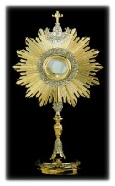

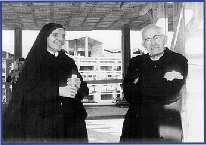



OUR BEGINNINGS
1923 - 1925
Recounted by
Fr. Timothy Giaccardo
Chapter V
The first young women wrote thus about the meditations preached by the Theologian:
“He lovingly broke ‘bread’ for us so as to nourish our infant souls and weak wills. How sweetly those truths, advices and words - spoken so sincerely - descended into our hearts!”
The mission of the Daughters of St. Paul is complementary and, in many ways, parallel to the mission of the Society of St. Paul. The first adult Daughters numbered three, and they had to train the younger girls in work and spirit, and also teach them…. In the meantime none of these first young women had a diploma. One Sunday, after the usual conference and directives, the Theologian spoke to the Daughters about the vast harvest field awaiting the workers of the Good Press and the topic of study came up.
Miss Boffi said: “You can’t imagine how much I’ve longed to become a teacher in order to be able to do more good!”
The Theologian replied: “So why not do it now?”
“If only it were possible! ”
”
“Begin to study. I’ll help you with some of the lessons. The Lord will take care of the rest.”
This was toward the middle of July, and in October Miss Boffi satisfactorily passed the state examination in Nizza Monferrato. The following year she studied other subjects and took the examinations on them. In October 1917, while still carrying out her duties in the House and in the office where she worked, she obtained her teaching license and started to teach at home. A great step had been taken toward opening the door to the vocations sown in the hearts of many young girls.
(SP, 20 October 1923, pp.23-24)
Chapter VI
The work of formation – and also of creation, we could say – had begun. The Theologian suggested to the first Daughters of St. Paul that the time had come to also admit younger girls. These students were to attend school and at the same time learn the art of printing. And that’s what happened.
The first adolescent to join the group was a girl from Benevello called Emilia. She entered on 13 March 1917. She was so tiny and confused at the beginning that she often hid under the table. Five other girls (which seemed a large number at that time) entered shortly after. They learned to fold catechisms, and they were also given classes. Three of those first five left. Two remained and today are Servants of Mary [FSP novices]. Having finished their basic education, they are now in a teacher-training program. It was a significant step forward in the establishment of the Institute of the Daughters – a step that was made in hiddenness and characterized by sacrifice and patience. The Feminine Workshop had retained its name but was losing its original character. It had taken on that of a House for the Good Press and a house of formation for Apostles of the Good Press.
It was God who gave those first young women understanding and strength, and who created things. Here are Maestra Thecla’s impressions of those times: “All this gave us courage because at certain moments everything seemed so dark that we understood nothing. For my part, however, I was never afraid, des pite all the talk and the crosses to bear in the House. We had the greatest confidence in the Theologian, a condition that is absolutely necessary for a House that is just beginning. Our hearts remained at peace, knowing that we were being guided by a good Father who sought only our good. Once the Theologian said to me: ‘It seems to me that you have great trust in the Theologian; instead, trust only in the Lord.’ Those words made me reflect deeply and I said to myself: Naturally I have great trust in the Lord, but I also have great trust in the Theologian, because I know he has been sent by God; thus where he leads I cannot be mistaken in following.”
pite all the talk and the crosses to bear in the House. We had the greatest confidence in the Theologian, a condition that is absolutely necessary for a House that is just beginning. Our hearts remained at peace, knowing that we were being guided by a good Father who sought only our good. Once the Theologian said to me: ‘It seems to me that you have great trust in the Theologian; instead, trust only in the Lord.’ Those words made me reflect deeply and I said to myself: Naturally I have great trust in the Lord, but I also have great trust in the Theologian, because I know he has been sent by God; thus where he leads I cannot be mistaken in following.”
(SP, 20 November 1923, pp.22-23)
Chapter VII
Due to the kind of work each of the three older members of the group carried out, they were hardly ever together. One ran the book shop; the second always spent the morning at the company where she worked; and the third spent her time cooking meals for the boys of the Typographical School, who were not yet able to manage on their own. The Theologian also had other things to do.
The custom of spiritual reading was introduced in the House. Every morning at nine – the only hour in which everyone was more or less free – one of the young women read aloud while the others listened, keeping their hands busy with sewing or knitting. Today the rosary is recited while working. Instead, during the spiritual reading (which is done twice a day), everybody stops what they are doing, because now that group is so numerous, the person reading cannot be heard throughout the workshop.
Maestra Thecla recalls the importance of those readings: “That quarter of an hour of reading, and all the other moments we spent together, gave us the strength to forge ahead in a way we could not explain. Perhaps it was due to the fact that our activities kept us apart the whole day, so that we came together only at mealtimes.” The name Feminine Workshop had by now entirely lost its meaning because in addition to running the New Book Shop, the young women had also begun the printing apostolate.
The Lord guides and disposes everything with regard to number, weight and measure. The wisdom and the Providence of God cannot be deceived, nor will those who allow themselves to be led by Providence be deceived. Whoever resists God or wants to move ahead on her own is on the wrong path and it will lead to a dead end. Those who are docile, who trust in God and correspond to his graces, reach their goal even if the road God asks them to take requires sacrifice, humility, and obscurity in everything. The printing apostolate was a kind of mercy, a providence of God that was initiated at the right moment.
Some second-hand equipment was purchased at Canale and with this the young women set up their Workshop. News of this upset a number of people in Alba, in particular small typography businesses, but the Daughters of St. Paul were not founded to compete with other printers. Just like today, their intense work causes no damage to anyone because it is different; it is something that other printers would not do.
Although the printing press in the Gatti typography did not function, the sewing machine did, and this was placed at the service of the Good Press. The printing press was sold. The work of the younger girls was limited to the typesetting of books. The packages of type frames were then taken to the Typographical School for impagination or printing.
It was the beginning of the printing apostolate, but the young girls were… well, young, and this was both necessary and good.
(SP, December 1923, pp.19-20)
Chapter VIII
On Sundays a small form of propaganda was begun – something simple but good for souls and effective for forming the young women in the spirit of their vocation. They set up a little table at the door of St. Damian Church and of other churches in the town and sold books and religious objects.
This initiative was suggested by priests and good people.… Two boys from the Typographical School came to help them. It was a way of doing good that filled the young women’s hearts with courage and threw light on their path. Obedience became a pleasure and the apostolate something they yearned to carry out. The cold hands and bodies on winter mornings served to inflame their fervor. Jesus had done more for souls: their sacrifices served as atonement for souls and for the small work of zeal they were performing. The priestly character of the Good Press penetrated their spirits also by way of the heart. At the doors of Jesus’ “houses” and for the sake of the souls belonging to him, they did what the priest does from the pulpit or from the altar for the benefit of those same souls. This small activity had its place in the knowledge, wisdom and providence of the Divine Master. The young women did not fully understand everything, but the others understood even less. Still others understood nothing at all and began to gossip. St. Paul would have said: “I regard everything as a loss when compared with the surpassing value of knowing Christ Jesus my Lord.”
Maestra Thecla describes it this way: “Criticism from the people was not lacking. Everybody wanted to know what was going on.… How many times they came to the book shop and asked endless questions. We had to be careful in answering those curious ones. There were those who asked questions and expressed approval; others (and they were the majority) criticized and sometimes also made fun of us. With God’s grace, their disapproval had the opposite effect on us. We confided everything to the Theologian. Just a word from him was enough to keep us serene.”
(UCBS, 15 January 1924, p.26)





 中文
中文



 English
English


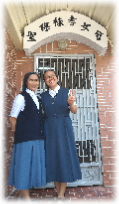
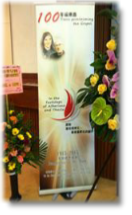
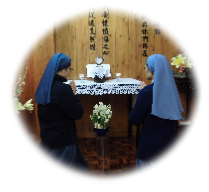
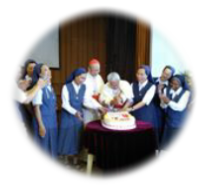
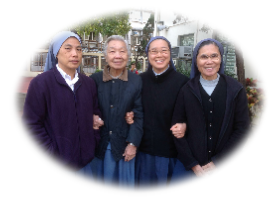








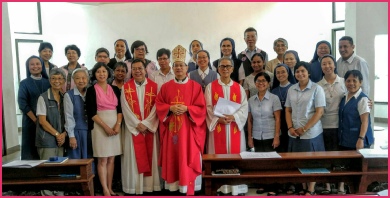
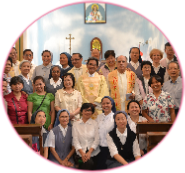



 ”
” pite all the talk and the crosses to bear in the House. We had the greatest confidence in the Theologian, a condition that is absolutely necessary for a House that is just beginning. Our hearts remained at peace, knowing that we were being guided by a good Father who sought only our good. Once the Theologian said to me: ‘It seems to me that you have great trust in the Theologian; instead, trust only in the Lord.’ Those words made me reflect deeply and I said to myself: Naturally I have great trust in the Lord, but I also have great trust in the Theologian, because I know he has been sent by God; thus where he leads I cannot be mistaken in following.”
pite all the talk and the crosses to bear in the House. We had the greatest confidence in the Theologian, a condition that is absolutely necessary for a House that is just beginning. Our hearts remained at peace, knowing that we were being guided by a good Father who sought only our good. Once the Theologian said to me: ‘It seems to me that you have great trust in the Theologian; instead, trust only in the Lord.’ Those words made me reflect deeply and I said to myself: Naturally I have great trust in the Lord, but I also have great trust in the Theologian, because I know he has been sent by God; thus where he leads I cannot be mistaken in following.”